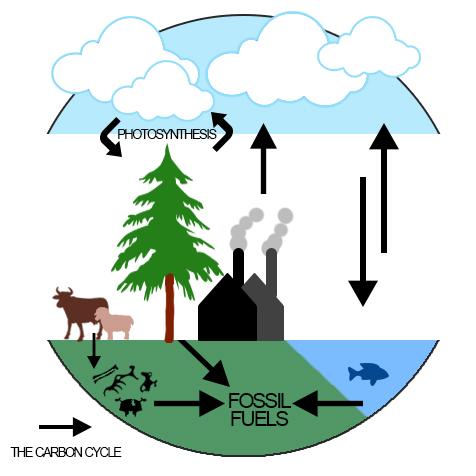Fossil fuel forum

Graphic: Azwan Azhar/ Iowa State Daily
Carbon is a major element that surrounds us. The arrows show the cycle of the carbon element on the earth.
December 4, 2013
Fossil fuels have been a debate in environmental sciences for years now, ranging from how they impact climate change to where they originate.
Climate is the average weather conditions over a long period of time. The idea of climate tends to be about the present and what the weather is like.
Ed Fallon, host of the Fallon Forum, discussed the question of whether fossil fuels will ever run out and what that means for the climate crisis.
Beth Caissie, assistant professor of geological and atmospheric sciences, said we cannot look at our climate changes and make the connection of it to carbon in the air.
“When you look back on how climate has changed … and you look at things like solar output and volcanic eruptions, all of these different things that could change climate, you really cannot explain the changes we have seen without carbon dioxide in the mix,” Caissie said.
Carbon dioxide levels in the atmosphere have been on the rise according to the Earth Systems Research Laboratory, with the current level at 393.66 parts per million.
Caissie said this number can be linked to the carbon cycle and the extraction of fossil fuels.
“There is carbon dioxide buried deep underground where the fossil fuels are, there are all these different places where carbon is stored,” Caissie said. “What that is doing is when you add carbon in the atmosphere to make carbon dioxide, you create greenhouse effect.”
The greenhouse effect traps the heat in the earth’s atmosphere rather than letting it escape. This effect allows the atmosphere to trap more heat and warm up, Caissie said.
Caissie said the process is unnatural because individuals are pumping carbon into the air so quickly.
While the amount of carbon dioxide affects the climate, it will take hundreds of years before citizens see the consequences in action.
“The predictions I’ve heard here in Iowa, we expect to have more persistent droughts and more major rainfall events … big rain and big droughts, not at the same time,” Caissie said.
She said that the number of 100 degree days is predicted to increase and the rainy seasons may shift.
The extraction of the fossil fuels is cheap and easy, yet it’s harmful to the environment. Dave Murphy, communications director at Climate March, said the reasoning for the continuation of extracting fossil fuels is greed.
“People have made a lot of money on oil, coal and natural gas, and it is seen as economically foolhardy to blow off their cash cow,” Murphy said.
A solution to reserving this nonrenewable resource may be renewable energy such as wind or solar. However, those too have to be made with minerals Caissie said.
“[To say] fossil fuels are bad and alternative energy is good, I think that may be simplistic,” Caissie said. “If you look at wind and solar, you are also having to mine minerals that we need to put into these super high-tech solar panels … there are trade-offs for everything.”
Even the minerals need to be mined and brought to their locations using these fossil fuels. For example, the large trucks carrying those windmills run on a form of gas to get the renewable energy source to their destination.
“You are not going to take [the carbon dioxide] out over night, but what can we do to slow it down a little bit,” Caissie added.
Murphy said little things like walking more and using less gas are things individuals can do now. The main goal is to wean society off fossil fuels as much as possible.





